Beauty salons are set up and run by experienced beauty therapists who provide a wide range of treatments, such as facials, lash and brow treatments, massage, manicures and pedicures, hair removal, and tanning.
Most salons also provide specialist treatments such as dermaplaning, LED facials, microblading, microdermabrasion and non-surgical facelifts.
This profile provides information about starting up and running a beauty salon. It describes the skills required, the training available, the current market trends and the key trading issues. It also explains the legislation that must be complied with and provides sources of further information and support.
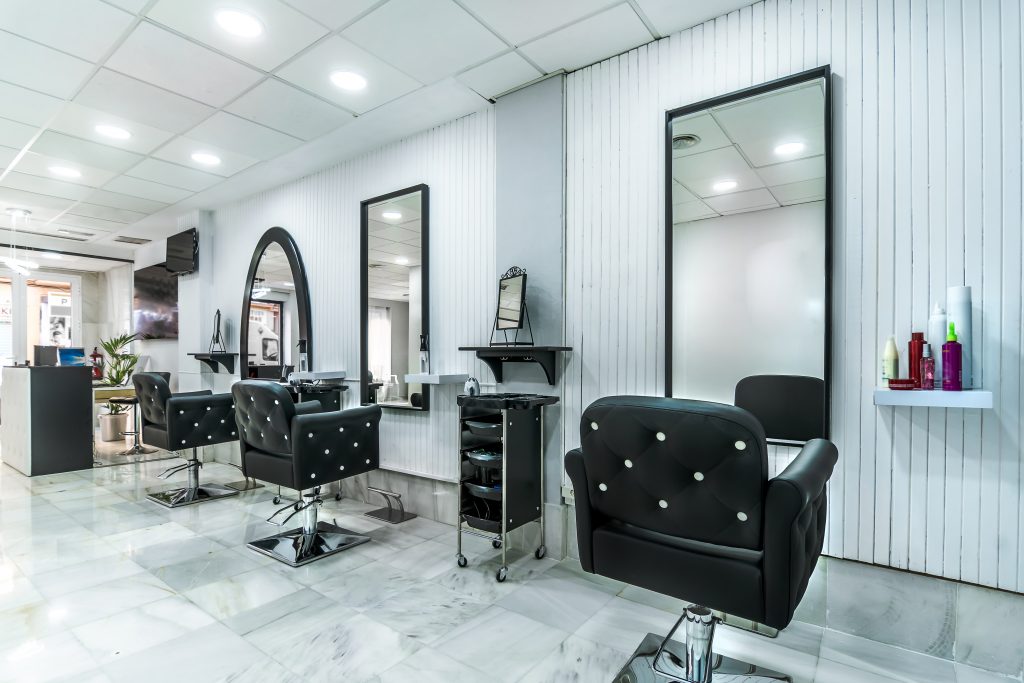
Qualifications and skills
The following courses are suitable for anyone who lacks salon management experience, but is considering starting up a beauty salon:
- Level 2 Award in Preparing to Run a Hair and Beauty Business, which is accredited by the Vocational Training Charitable Trust (VTCT, www.vtct.org.uk/qualification-category/hairdressing-barbering/). The course covers the benefits and risks involved in running a business and laws and regulations. Go to www.vtct.org.uk/find-a-centre/ to search for a course provider.
- Beauty Salon Management Professional, which is a distance-learning course run by Stonebridge College covering topics such as opening and managing a salon, marketing, administration and bookkeeping. The course usually costs around £570. Go to www.stonebridge.uk.com/course/beauty-salon-management-professional for details.
- Salon Mega-Manager: Salon Management Course, which is run by Full Column Ltd and includes an online business assessment and one day of training. The course costs £1,080 (excluding VAT) and covers staff management, including formal training policies and contracts of employment for apprentices, therapists and receptionists. Go to www.fullcolumn.co.uk/salon-mega-manager.html for details.
- A range of online courses run by the Salon Managers Academy, including the six-month Level 2 Salon Manager Master Class. The course covers employee appraisals, training needs analysis and personal development plans, and costs £945 (excluding VAT). Go to https://salonmanagersacademy.com/salon-managers-academy/salonmanagement-level-2/ for details.
- Free videos and webinars provided by HM Revenue & Customs (HMRC), covering topics including Making Tax Digital, self-assessment, VAT, self-employment and becoming an employer. Go to www.gov.uk/government/collections/hmrc-webinars-email-alerts-and-videos for more information.
Apprenticeships
Most beauty salons take on trainees as apprentice beauty therapists. The salon is required to provide appropriate training and mentoring. Funding is available towards the cost of training, depending on the apprentice’s age and where in the UK the salon is based.
For more information about apprenticeships, go to:
- England (www.nhbf.co.uk/advice-and-resources/apprentices-and-t-levels/apprenticeships-in-england and www.gov.uk/employing-an-apprentice).
- Wales (https://careerswales.gov.wales/employers/apprenticeships-information-for-employers).
- Scotland (www.apprenticeships.scot/for-employers#/apprenticeoptions).
- Northern Ireland (www.nibusinessinfo.co.uk/content/apprenticeships-explained-employers).
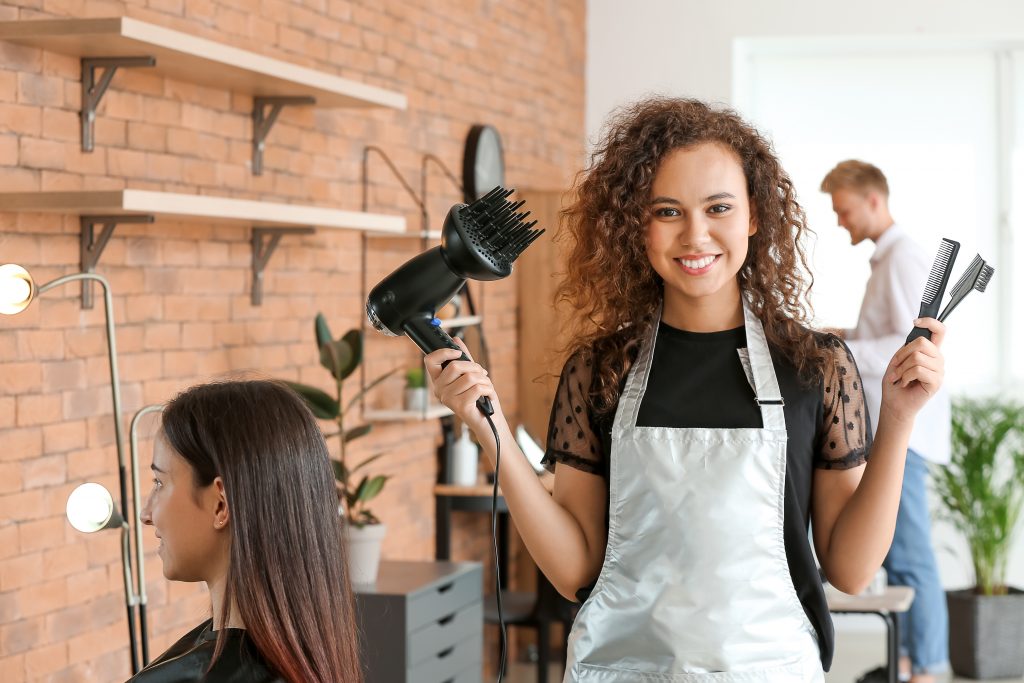
Beauty therapists can keep up to date with developments and improve their awareness of trends by attending events and reading professional journals and resources such as:
- Blogs published by Salon Services (www.salon-services.com/blogs?fdid=blog).
- ‘Vitality’, which is a journal available exclusively to British Association of Beauty Therapy & Cosmetology (BABTAC) members. It is published every other month and features industry news and trends (www.babtac.com/professionals-students).
- ‘Guild Gazette’ (www.beautyguild.com/Guild-Gazette), which is a trade journal published every other month by the Guild of Professional Beauty Therapists. It features industry news and trends, treatment and product reviews, and details of training opportunities.
- ‘Professional Beauty’ (https://professionalbeauty.co.uk/site/Home), which is a monthly online and print-based trade journal for salon owners and beauty training providers in the UK. It provides industry news and analysis, product and treatment reviews, and in-depth articles about treatments.
- News published by Habia, which also publishes details of the latest sector developments, such as new legislation that paves the way for a licensing scheme for therapists in England, at https://habia.org/news.
- Beauty UK (https://beautyukshow.com), which is a two-day ‘three shows under one roof’ trade event for salon owners and beauty therapists held each June at the Coventry Building Society Arena, Coventry. The event features exhibits and demonstrations from product manufacturers and provides opportunities to network with potential suppliers.
- Holistic Health (https://holistichealthshow.co.uk), which is part of Beauty UK and is a two-day event for the beauty, complementary therapy and hair sectors that features exhibits from around 600 brands of holistic health, beauty and nail products.
- Olympia Beauty (www.olympiabeauty.co.uk), which is a trade-only exhibition for the hair and beauty industry held over two days at Olympia, London in October. It features a supplier exhibition and provides networking opportunities.
- SalonGeek (www.salongeek.com), which is an online community for hair and beauty professionals that provides opportunities to share best practice and discuss industry developments.
Key market issues and trends
Current market issues affecting both start-up and established beauty salons include the following:
- In 2021, there were more than 46,000 hair and beauty businesses operating in the UK, a year-on-year increase of 3%. This was according to statistics published by the National Hair and Beauty Federation (NHBF). Self-employed therapists made up 65% of people who work in the beauty sector, up from 57% in 2019. Around 30% of therapists operate on a mobile basis, along with working in a salon (www.nhbf.co.uk/news/hairdressers-and-beauty-therapists-convert-garages-and-go/).
- A report published by the NHBF in April 2022 warned of a skills and recruitment crisis in the hair and beauty industry. The report identified multiple factors contributing to the shortage, such as rising self-employment and business costs, and a fall in the number of apprentices. Around 57% of the 600 salons contributing to the report had unfilled vacancies (www.nhbf.co.uk/news-and-blogs/news/nhbf-report-confirms-skills-crisis-in-hair-and-beauty/).
- Gel manicures and eyelash extensions are two of the most popular beauty treatments. Treatments increasing in demand also include dermaplaning, brow lamination and sugaring. Hair removal and facial treatments each made up 18% of bookings (www.policybee.co.uk/blog/uk-hair-and-beauty-industry-statistics).
- In July 2022, Superdrug expected that the increase in sales of DIY beauty tools caused by the pandemic would continue, especially during the cost of living crisis. Superdrug found that 21% of consumers planned to continue using at-home beauty treatments instead of treatments provided by therapists (www.retailgazette.co.uk/blog/2022/06/superdrug-posts-rise-in-at-home-beauty-products-as-pandemic-trend-remains).
- The Government has announced plans to introduce a licensing scheme for non-surgical cosmetic procedures. As part of the scheme, beauty therapists and salons that provide non-surgical cosmetic procedures (aesthetic procedures) and operate in England will need to become licensed by their local authority. Non-surgical procedures include treatments that include the insertion of needles into the skin or the application of light, electricity, cold or heat. Go to www.jccp.org.uk/NewsEvent/the-health-care-act-and-the-future-licensing-of-aesthetic-practitioners-completing-non-surgical-cosmetic-aesthetic-procedures for more information.
Trading, commercial and legal issues
Start-up and established beauty salons face the following trading, commercial and legal issues:
Local authority regulation
In some areas of the UK, beauty salon premises where certain massage and other treatments are carried out must be covered by a ‘massage and special treatments’ (MST) licence issued by the local authority. Examples of other treatments include manicures, pedicures, light treatments and microblading. Individual therapists may also require MST practitioner licences.
In Scotland, salons which carry out microblading must be covered by a skin-piercing business licence issued by the local authority.
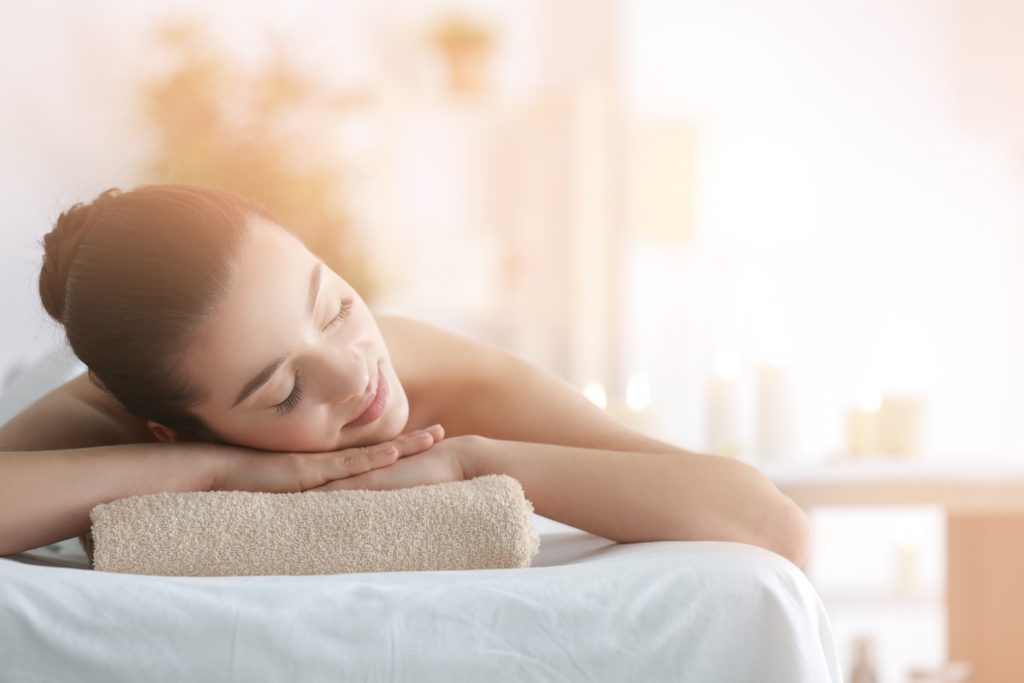
Trade body membership
Membership of a trade body can provide a wide range of individual and business benefits. Relevant bodies include:
- The Salon Employers Association, which represents VAT-registered salon owners who employ staff. Membership benefits include policy and protocol updates. Go to www.salonemployersassociation.co.uk for more information.
- The National Hair and Beauty Federation (NHBF, www.nhbf.co.uk/home), represents the UK’s beauty, hairdressing and barbering sectors. Benefits of salon membership include treatment risks insurance cover, access to an employment helpline and up to £50,000 legal expenses insurance cover, a subscription to ‘Salonfocus’ and ‘how to’ guides on topics such as chair rental, workplace health and safety and salon marketing. Single salon membership costs £278 per year (excluding VAT).
- The British Association of Beauty Therapy & Cosmetology (BABTAC, www.babtac.com), which represents the beauty, hair and complementary therapy sectors. Salon membership includes professional indemnity, public liability, malpractice and treatment risks insurance cover. Membership benefits also include a free listing for the salon in the BABTAC directory and access to business, marketing and employment tools and guidance. Salon membership costs £190 per year for up to two practising beauty therapists and £240 for up to three therapists.
Salon premises
Under the Equality Act 2010, beauty salons must make reasonable adjustments to avoid disabled clients being disadvantaged. Salons that fail to make reasonable adjustments must be able to provide a satisfactory reason for doing so. For example, they may need to fit a ramp to assist with wheelchair entry to the salon. In Northern Ireland, the Disability Discrimination Act 1995 (as amended by the Equality Act) applies. Go to www.equalityhumanrights.com/en/advice-and-guidance/equality-law-hairdressers-barbers-and-beauty-salons for more information.
Beauty salon owners who play background music at their premises must hold a licence to play music (known as TheMusicLicence), granted by PPL PRS Ltd. Go to https://pplprs.co.uk/hair-and-beauty-themusiclicence/ for more information.
The Health and Safety (First-Aid) Regulations 1981 and equivalent legislation in Northern Ireland require salon owners to keep adequate first-aid equipment for staff, such as a first-aid kit, on the premises.
Under the Regulatory Reform (Fire Safety) Order 2005 and equivalent legislation in Scotland and Northern Ireland, it is a legal requirement for salon owners to install appropriate fire detection and prevention equipment on their premises.
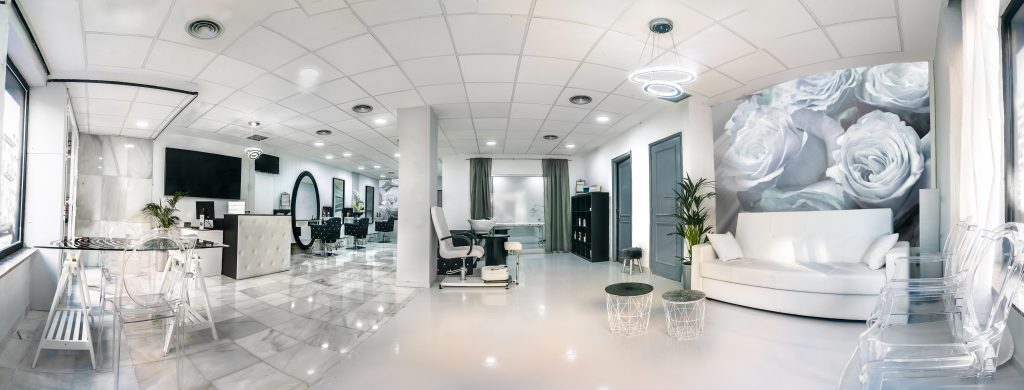
Salon management software
Salon management software enables beauty salons to manage therapists’ work rotas, client records, treatment preferences and appointment bookings.
Examples of specialist software include:
- Timely (www.gettimely.com/gb), which costs from £20 per month. A 14-day free trial is available.
- Salon Iris (https://saloniris.co.uk), which costs from £49 per month for a single-user licence.
- Salonized (www.salonized.com), which costs from £15 per month. A 14-day free trial is available.
Salon equipment
Examples of specialist equipment used by beauty salons (with prices including VAT) are as follows:
- Facial treatment machines (from £250 to £400 depending on the treatment provided).
- LED treatment machines (from around £3,000).
- Dermabrasion and colour therapy units (from £2,500).
- Facial and body contouring units (from £1,400).
- Professional microdermabrasion unit (from around £4,500)
- Facial steamers (from £80 to £400 each).
- Steam sterilisers (from around £50 each), bead sterilisers (from £220 each) or an autoclave machine used to sterilise equipment (from £1,500 to £12,000 each) and autoclave pouches (around £10 for 200 pouches).
Examples of suppliers include Salons Direct (www.salonsdirect.com), Direct Salon Furniture (https://directsalonfurniture.co.uk/beauty-equipment/microdermabrasion/diamond-microdermabrasion) and GTO Science and Technology Co. (www.gtoderma.com).
Treatment chairs, therapists’ stools, wax heaters and other equipment is available from Sally Salon (www.sallybeauty.co.uk) and Ellisons (www.ellisons.co.uk/furniture).
The Hairdressing & Beauty Suppliers Association (HBSA) is a membership organisation representing sector suppliers that lists members at https://hbsa.co.uk/members.
Specialist shopfitters for beauty salons include Salon Interior Design (www.saloninteriordesign.co.uk) and Moda Salon Interiors (www.modasaloninteriors.com).
Beauty products and cosmetics
Beauty products, including cleansers and toners, scrubs and moisturisers, wax, tanning spray, eye lashes, adhesives and tints are available from a variety of specialist wholesalers and suppliers, including Beauty Express (www.beautyexpress.com), Aston & Fincher (www.astonandfincher.co.uk) and Capital Hair & Beauty (www.capitalhairandbeauty.co.uk/mandssupplies).
Beauty salon owners may be required to apply to become approved stockists or brand ‘partners’. Go to www.dermalogicaconnect.co.uk/Home/Main for an example.
Salons may have to provide evidence that therapists have received appropriate training before buying chemical peel solutions and other products that are only suitable for professional use.
Under the Cosmetic Products Enforcement Regulations 2013, suppliers of cosmetic products are required to provide certain information on the labels of cosmetics. Salon owners must check that the labelling information printed on containers and packaging cannot be rubbed off, is easy to read and is clearly visible.
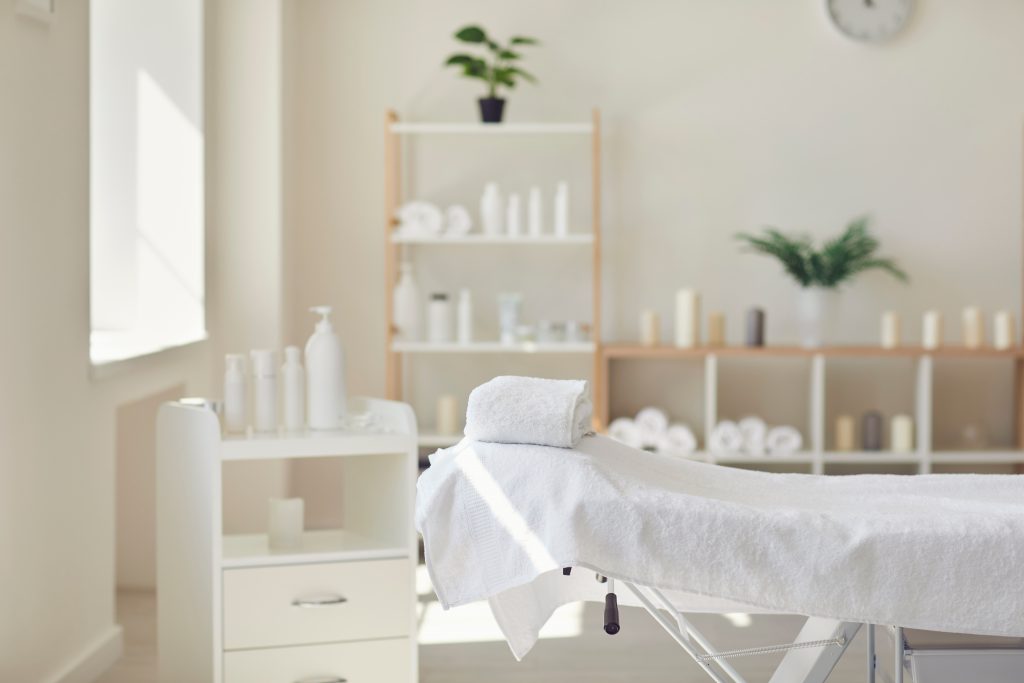
Consumer and business protection legislation
Under the Consumer Contracts (Information, Cancellation and Additional Charges) Regulations 2013 (CCRs), salons are required to provide consumers (meaning clients acting for purposes unconnected to their business or profession) with specific pre-contract information, such as their pricing, payment and cancellation terms.
Under the Consumer Rights Act 2015, salons must provide beauty treatments with reasonable care and skill. Beauty products must be of satisfactory quality, as described and fit for purpose.
Under the Consumer Protection from Unfair Trading Regulations 2008 and the Consumer Protection (Amendment) Regulations 2014, it is an offence for a salon to misleading consumers, for example about pricing or their therapists’ qualifications.
The Business Protection from Misleading Marketing Regulations 2008 make it an offence for a salon owner to make unfair comparisons between their own services and those of other therapists or salons.
Advertising standards
In order to comply with the UK Code of Non-broadcast Advertising and Direct & Promotional Marketing (the CAP Code), salons must ensure that any advertising related to beauty treatments is legal, decent, honest and truthful (www.asa.org.uk/codes-and-rulings/advertising-codes.html).
The Advertising Standards Authority, which is also responsible for enforcing the CAP Code, provides guidance on advertising a range of beauty treatments, including anti-ageing creams and peels, eczema treatments, cellulite reduction, hair removal methods and massage. Go to www.asa.org.uk/advice-and-resources/resource-library/advice-online.html for more information.
Client health and data protection
Before treating a client for the first time, the salon should ask the client if they are under the care of a medical practitioner. For certain treatments, a salon should ensure that a ‘skin patch test’ is carried out at least 24 hours in advance to check whether the client will have an adverse reaction to certain beauty products.
Under the Data Protection Act 2018 and the General Data Protection Regulation (GDPR), any personal information that the salon holds about their clients should be kept secure and used only for the lawful purpose for which it was collected.
The Information Commissioners Office provides a guide to complying with data protection legislation at https://ico.org.uk/for-organisations/sme-web-hub/getting-started-with-data-protection-top-tips-for-beginners.
Self-employed therapists
Some salons have an arrangement with self-employed therapists who work in the salon on agreed days or times of the week. Self-employed therapists typically pay the salon a rental fee for a room or chair or the salon takes a percentage of therapists’ earnings.
Salons must also ensure that a self-employed therapist is actually self-employed and not an employee. Under HM Revenue & Customs (HMRC) rules, called IR35, if a beauty salon rents chairs or takes a commission (percentage split) from self-employed therapists and is the therapist’s sole source of work, it can be difficult to prove to HMRC that the therapist is genuinely self-employed or freelance. This can lead to an increased tax and NI liability for both the therapist and the salon. Go to www.gov.uk/guidance/understanding-off-payroll-working-ir35 for more information about IR35.
When using self-employed therapists, salons must check that the self-employed therapist holds an MST practitioner licence before allowing them to work in the salon, where appropriate.

If you’re in the midst of setting up your own beauty salon, do get in touch with our friendly team here at Chapmans Business Solutions. We can help you every step of the way and ensure you have everything you require to be legal and ready go to and open your doors to clients!
Call us on 01775 529345 or drop us a line at office@cbsltd.org.
Leave a Reply